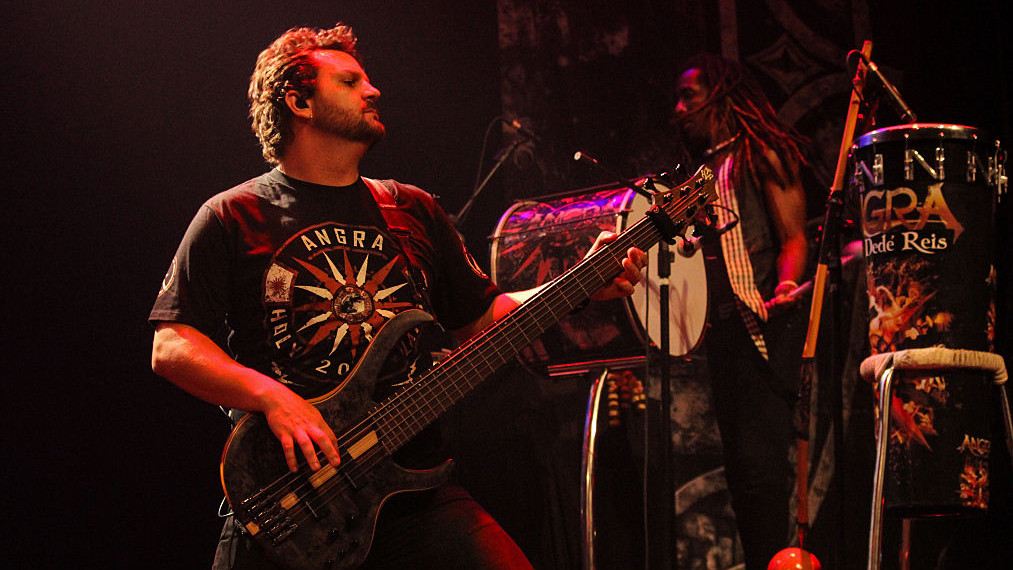Angra’s Felipe Andreoli: “I’ve never stopped playing the bass, it was very natural for me”
We talk to the Brazilian virtuoso

Want all the hottest music and gear news, reviews, deals, features and more, direct to your inbox? Sign up here.
You are now subscribed
Your newsletter sign-up was successful
Technical wizard Felipe Andreoli of Brazilian headbangers Angra reveals how he delivers those super-slinky lines.
Tell us about your bass gear, Felipe.
“I use the Aguilar AG700 head, which can handle any room, and their DB810 cab, which is a powerhouse. Even though I use in-ear monitors, I like to feel the speaker shaking. It also complements the PA in a very nice way. Apart from that, I use Ibanez BTB six-string basses fitted with Aguilar pickups. I use D’Addario cables and strings, and there’s a lot of pedals too.”
Have you always been an Ibanez player?
“I started playing Ibanez when I was 14 years old. I went to other brands, but finally I returned home three years ago and struck a deal with Ibanez, which I was very happy about. At first I stuck with my old SR series basses because I thought they fit me better, but the guys were pushing me towards the BTBs and as soon as I went on the road with them I fell in love.
"They’re all I use. I use six-strings 90 percent of the time; I do use the occasional four-string, but not in Angra. They’re for when I need a more funky, vintage sound.”
How did you get into bass?
Want all the hottest music and gear news, reviews, deals, features and more, direct to your inbox? Sign up here.
I did a gig on bass and vocals within a week and a half of picking it up
“I got into bass by accident. First I wanted to be a drummer, but my dad didn’t want a drum set in the house, ha ha! So I started playing acoustic guitar, which we all do in Brazil, and soon enough a band formed at school and they needed a bass player. I bought a bass for $80 and here I am.
"I’ve never stopped playing the bass, it was very natural for me. I did a gig on bass and vocals within a week and a half of picking it up. It came natural to me, so I stuck with it because I knew what I wanted to play for the rest of my life.”
Who were your influences?
“The first guy was Cliff Burton, for sure. I was so completely into Metallica. Jeff Ament of Pearl Jam is a huge influence as well. Billy Sheehan and Geddy Lee too, of course, but also the fusion guys such as John Patitucci, Alain Caron, Victor Wooten, Stanley Clarke and Jaco.
"Although I play metal, I try to add fusion elements to make it more interesting and rhythmic and rich, not just root notes.”
How did you develop such a precise three-finger picking style?
“I evolved it from watching old VHS home videos from Mr Big and Dream Theater and trying to emulate what they did, not knowing exactly what it was. It took me a while, and at first I tried it at rehearsals and it sounded like shit, but eventually it cleaned up simply because someone asked me to teach it to them.
"I had to stop and think what it was that I actually did! So now I have a defined technique which is associated with my playing.”
EQ-wise
How do you manage to create such a tight B-string tone?
“Of course the right gear is paramount, but it’s mostly to do with the way you attack the string. I play really hard and really dig in, because the B-string won’t sound clear if you play it too soft. EQ-wise, I try not to go too low; I see many bass players making the mistake of using the sound that they want to hear when they’re alone, but that sound seldom works in a band situation.
"I try to adapt the EQ curve so that there’s not a lot of low end or sub-lows. It sounds defined and round, which is what I always look for. You also need balance with the other strings: sometimes you’ll have a very present treble section and a very weak low section, so I try to balance that.”
What is good bass playing, as you see it?
Timing is the bass player’s biggest asset. You need to be ahead of the beat, on it, or behind it
“Timing is the bass player’s biggest asset. You need to be ahead of the beat, on it, or behind it. Then, tone: the right tone for the right music. It’s rare to see that. Most bass players who have these two attributes tend to have one other important attribute, which is playing the right notes for the gig.
"They’ve done the research and the work needed to learn their style on the bass, but being in the pocket is still one of the greatest assets for a bass player.”
Do you incorporate traditional Brazilian music into your playing?
“I do. I’m not an expert at Brazilian music, like some of the amazing bass players that we have in this country, but I try to insert some of the rhythms in the two-handed tapping that I do, with the right hand as the bass drum and the left hand as the snare. And in the harmonies that we write, we take a lot from traditional Brazilian music.”
Which Angra songs should we listen to for your best playing?
“From the latest record, Omni, I would suggest ‘Insania’, and also try ‘Upper Levels’ from the previous album, Secret Garden. That one has a really ethnic feel and starts with a Latin part before evolving into a Rush-style progressive groove.”

